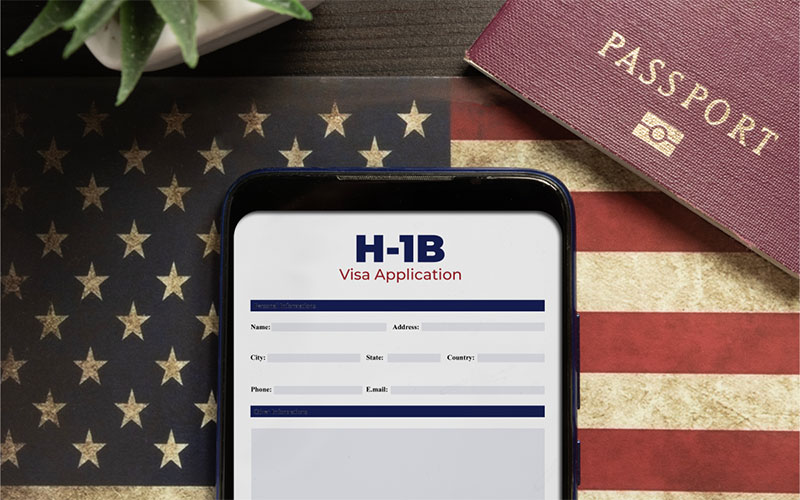The U.S. government’s latest revisions to the H-1B visa program have ignited significant discussions across the tech and business sectors. Designed to attract highly skilled foreign workers, the H-1B visa remains a cornerstone of the U.S. economy, especially in industries like technology, healthcare, and engineering. However, recent changes aim to address growing concerns about misuse and labor market disruptions.
One of the most notable changes involves stricter scrutiny during the lottery process to ensure that applications meet specialized skill criteria. The U.S. Citizenship and Immigration Services (USCIS) also announced plans to implement additional measures to prioritize advanced degree holders and U.S.-based educational qualifications. These reforms seek to align the program more closely with its original intent—filling skill gaps rather than replacing domestic workers.
Critics argue that these changes could burden employers, especially startups and small businesses, with additional compliance costs and paperwork. Tech giants like Google, Microsoft, and Amazon, which rely heavily on H-1B workers, have voiced concerns about potential delays in hiring top global talent. Conversely, proponents of the reform emphasize its role in safeguarding American jobs and ensuring fair competition.
The impact on international workers cannot be understated. For many, the H-1B visa represents a pathway to the American dream, providing opportunities for career advancement and financial stability. The reforms may limit access for first-time applicants, shifting the balance toward those with established U.S. credentials.
In the broader context, the H-1B visa changes come amid increasing global competition for talent. Countries like Canada and Australia are actively revising their immigration policies to attract skilled workers, creating alternatives for those deterred by U.S. restrictions.
This development underscores the delicate balance between fostering innovation and protecting domestic labor markets. Policymakers must navigate these challenges to ensure the U.S. remains a hub for global talent while addressing valid concerns about fairness and equity.
With the debate surrounding the H-1B visa program heating up, businesses, workers, and policymakers alike await further details on how these changes will shape the future of U.S. immigration and economic growth.




Thanks for sharing. I read many of your blog posts, cool, your blog is very good.
I don’t think the title of your article matches the content lol. Just kidding, mainly because I had some doubts after reading the article.
which of the following is a correct description of an anabolic pathway?
References:
Anavar Bodybuilding Dosage
hgh fragment 176-191 kaufen
References:
https://sponsorjobs.com.au
hgh kaufen apotheke
References:
https://sosi.al
hgh fragment 176 191 kaufen
References:
apk.tw
legal steroids to get ripped
References:
Anavar Dosages
somatropin hgh kaufen
References:
https://ematixglo.com/
test e and dianabol cycle
References:
Valley.Md
hgh anti aging dosierung
References:
hgh wirkungseintritt – https://quaillink.Com/indirasteil462,
fast acting deca
References:
steroid addiction symptoms (https://dzmariage.Com/)
illegal supplements
References:
steroids to get lean (https://gitea.mocup.org/erikworthy142)
steroid pills for muscle building
References:
Buy Steroids Review [Git.Hanckh.Top]
crazy mass bulking stack review
References:
testosterone steroid cycle [https://hiphopmusique.com/Abbie78744474]
alcohol and prednisone
References:
anabolic steroids are a synthetic version of testosterone.
(telegra.ph)
how long to feel effects of ipamorelin
References:
https://matchmingle.fun/@pearlinegetty
what are the benefits of cjc 1295 ipamorelin
References:
how Much is ipamorelin
cjc-1295 + ipamorelin
References:
ipamorelin tesamorelin blend
fragment 176-191 & mod grf 1-29 & ipamorelin blend
References:
cjc 1295 ipamorelin near me
does cjc 1295 ipamorelin need to be refrigerated
References:
fragment 176-191 & mod grf 1-29 & ipamorelin blend
(https://play.ntop.tv/User/blousegrey3/)
cjc 1295 ipamorelin dosage calculator female
References:
ghrp-2 vs ipamorelin Reddit
ipamorelin igf 1 for sale
References:
Best injection site for Cjc 1295 Ipamorelin
ipamorelin cream
References:
valley.Md
cjc 1295 ipamorelin troche vs injectable
References:
https://jobs.foodtechconnect.com/companies/ipamorelin-peptide-everything-you-should-know/
how to reconstitute 2mg ipamorelin
References:
Valley.md
best time to inject ipamorelin bodybuilding
References:
Cjc ipamorelin peptide (https://urlmini.io/phillissteigra)
Shining Crown demo oyunu ilə klassik meyvə slotunu risksiz sına.
Crown shining sadə və maraqlı oyun təcrübəsidir.
Shining crown slot oyna mobil və PC üçün uyğundur. Shining crown jackpot böyük həyəcan gətirir. Shining crown online casino real pulla oynamaq imkanı verir.
Shining crown slot online hər yerdən oynana bilər.
Shining crown slot oyna istənilən cihazdan mümkündür.
Daha ətraflı buradan baxın shining crown demo.
Shining crown jackpot həyəcan dolu anlar yaşadır.
Shining crown pacanele oyunçular arasında çox populyardır.
prohormone steroids
References:
taking creatine while On Testosterone (http://www.onlywam.Tv)
best natural anabolics
References:
valley.md
anabolic steroids vs corticosteroids
References:
superdrol 250 reviews (Meeting2up.it)
truth about steroids
References:
best mass building steroids (https://adsearnmedia.com/)
Maraqlı dizayn və yüksək RTP ilə Sunny Coin Hold The Spin fərqlənir. Sunny Coin hold the spin slot online çoxlu istifadəçi qazanır.
Sunny coin 2 hold the spin slot strategiyaları öyrənməyə dəyər. Sunny Coin Hold The Spin slotu yüksək keyfiyyətli qrafikaya malikdir.
Əlavə məlumat üçün bax http://sunny-coin.com.az/.
Sunny coin 2: hold the spin slot pulsuz versiya rahatdır. Sunny coin hold the spin oyna və fərqli təcrübə qazan. Sunny Coin Hold The Spin slot oyunu çoxlu bonus təklif edir.
Sunny Coin 2 hold the spin slot yeni oyunçular üçün uyğundur. Sunny Coin Hold The Spin oyunu hər büdcəyə uyğundur.
long term effects of anabolic steroids
References:
half life Of Steroids (https://git.ezmuze.Co.uk)
I don’t think the title of your article matches the content lol. Just kidding, mainly because I had some doubts after reading the article.
pure 6 anabolic
References:
Losing Weight After Steroids [http://Www.Factory18.Cn]
is androgen a steroid
References:
steroid body vs natural body [cutenite.com]
professional bodybuilders steroid cycles
References:
best testosterone steroid (git.joypetsisland.com)